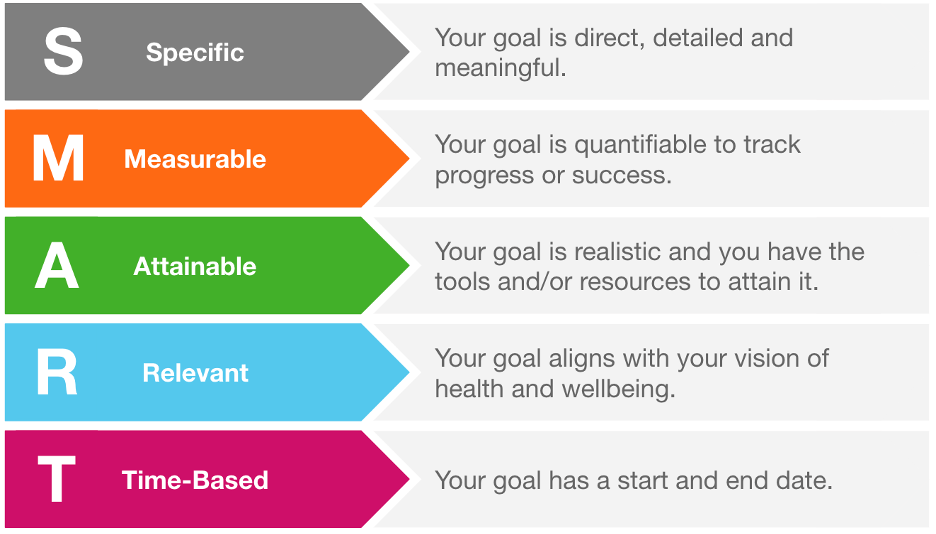
Coaches are here to help you envision your best self, and make that vision a reality. Goal setting is a major part of undergoing this positive change. SMART is an acronym that sets a criteria for making an ideal goal that has a higher probability of success.
This is an example of what we hear clients often say in coaching: My goal is I want to look and feel better, live a more meaningful life and work on my bucket list.
Well, that can be vague, overwhelming and tough to know where to begin. Using the SMART framework with a trained coach can help.
Make your goals Specific
Often people make goals that are not specific or clear enough to take action on or achieve targets. For example, you may want to start spending more time doing an outdoor hobby.
- Non-specific goal: I want to spend more time outdoors cultivating a hobby.
- Specific goal: I want to learn to garden and build a small garden in my backyard that will give me fruit and vegetables by next year.
To make this goal Specific, ask yourself: What specifically do I want to achieve?

Make your goals Measurable
Goals that are measurable allow you to see your progress, stay motivated, and work towards completion. Say you want to gain muscle mass and become a physically stronger person. That’s a great goal for many reasons but, as such, it isn’t something that can be measured.
Just saying that you want to be stronger may not provide much motivation. Maybe in a month you’ll be lifting more than you were before, but aiming to lift a specific goal weight that you set a month back will help you to keep pushing yourself toward new goals, track your progress, and evaluate your process. If you practice squats one or two times per week, and write down the weight you’re able to lift, you and your coach can actually evaluate progress to stay on target.
Non-measurable goal: I want to squat more weight.
Measurable goal: I want to be able to complete a squat with a weight of 200 pounds by July 31.
To make this goal Measurable, ask yourself: How will I measure my progress to know I’m on the right track?

Make your goals Attainable
Do you feel confident that your goal is doable? Making sure that you are setting a goal for yourself that you can follow through with, given where you are right now and the resources you have on hand, is a key part of setting goals that don’t lead to feeling discouraged. Perhaps you’ve set lofty goals in the past that just end up being too much too fast and then find yourself unmotivated to make progress. Starting small is key!
Maybe you don’t have much energy during the day, and you want to improve your sleep habits and sleep quality. It can be tempting to say that “I’m going to go to bed at a much earlier bedtime.” However, our bodies need time to adjust to making this transition easier and sustainable.
- Non-attainable goal: I will go to bed at 10pm instead of 1am starting tonight.
- Attainable goal: I am going to improve my quality of sleep by gradually increasing the amount of time I’m asleep versus awake. I’ll get into bed 10 minutes earlier each night for the next week and I will experiment with limiting screen time (turning my phone and TV off) 1 hour before bed each night.
To make this goal Attainable, ask yourself: Is my goal broken down into small, doable, steps and have I identified support and resources that I might need?
Make your goals Relevant
Goals that are relevant are connected to the bigger picture you have for your health and well being. This helps you to stay motivated and aligned with your sense of purpose and connection.
If you are isolated, this might be contributing to feeling depressed. Knowing that you want to build connection and community, and engage in an activity that you find personally meaningful, can help you formulate a plan to move in that direction.
- Non-relevant goal: I want to improve my nutrition.
- Relevant goal: I will identify an activity that I enjoy and look for community groups that I can join where people are engaging in this activity in a communal setting.
To make this goal Relevant, ask yourself: Is this goal connected to my bigger picture and does it align with my core values?

Make your goals Time Bound
Having a date by which you want to reach your goal (as opposed to “someday”) helps you stay focused, motivated and accountable.
If your goal is saving $3,000 to go on a dream vacation, then setting a date by which you want to be able to book your flights and accommodations could help you resist unnecessary spending.
- Non-time bound goal: I will save $3,000 to go to Japan.
- Time bound goal: I will save $3,000 and book my summer trip to Japan by February 10th of next year.
To make this goal Time Bound, ask yourself: When will I start and end?
Once you’ve created your smart goals, make sure to review them and ask yourself: On a scale of 1-10 (1 = not possible, 10 = I got this!) – How confident do I feel in accomplishing my new SMART Goals?
If you find yourself feeling less than confident, that is okay. Goals can be modified, now, and in the future! Review your SMART goals and see if there are any tweaks or changes you can make in one or more of the SMART areas to increase your level of confidence. It’s okay to revise until you feel confident that your goals are within reach.
Partner with a Health and Wellness Coach to develop and achieve your SMART goals
Approaching your coaching goals with SMART criteria will allow you to get the most out of your sessions, and provide you with your best chance at achieving those goals. Lemonaid coaches can help you learn how to use the SMART framework as you prepare for success. You can meet with them regularly over video, and you can also check in via secure messaging anytime you need support in between your regular meetings.











